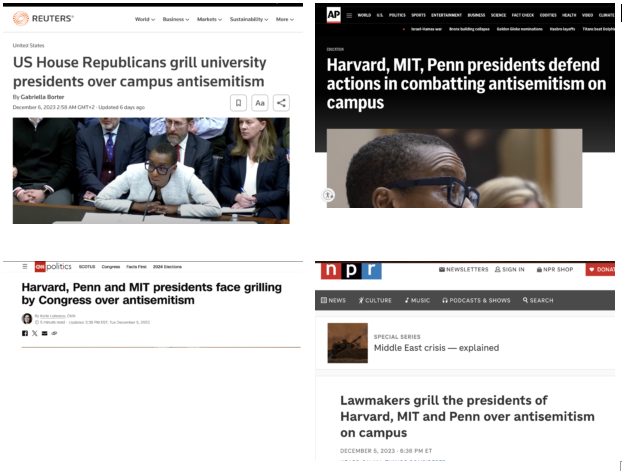US and international media have widely covered the backlash sparked by last week’s testimony of American university heads before a House committee, in which they refused to outright condemn calls for genocide against Jews.
But in their immediate coverage of the congressional hearing — i.e. before a storm erupted thanks to those unwilling to let antisemitism slide — the media were blind to what should have led their reporting and only later became a huge story.
A survey of the coverage on the day of the hearing reveals that Reuters, AP, CNN, NPR, The New York Times, and Washington Post either ignored or buried the specific line of questioning that had pinned down the trio of presidents — Claudine Gay of Harvard, Penn’s Lizz Magill and Sally Kornbluth of MIT — who all evaded answering Republican Representative Elise Stefanik’s simple “yes” or “no” question about whether calls for genocide against Jews violate their institutions’ codes of conduct. They all said it was dependent on the context.
These media focused on other issues that arose during the hearing and created the impression that the university presidents had to defend themselves against an attack — as it was also represented later, some might say tastelessly, by US satire show Saturday Night Live.

Related Reading: Israel-Hamas War Proves America’s Ivy League Colleges Are Festering With Violent Antisemitism – Part One
Reuters’ text did not include any mention of the problematic back-and-forth regarding genocide (although it later added a video clip of it). It dryly conveyed some of the presidents’ talking points in response to various questions, with some necessary background.
The agency’s reportage completely missed what should have been the headline: Heads of Ivy League universities fail to condemn calls for genocide against Jews.
AP did the same.
So if anyone on December 5 consumed their news solely from the wire services — that are responsible for distributing accurate information to hundreds of media outlets worldwide — he or she would have no idea that America’s elite universities had legitimized calls for the slaughtering of Jews.
Two months after Hamas had carried out a genocidal attack on southern Israel on October 7, triggering the rise in campus antisemitism that the committee set out to investigate, it’s incomprehensible how journalists could have missed the very discussion pertaining to such genocide.
CNN also ignored the exchange. It did quote a similar one, regarding “Intifada” and the slogan “From the River to the Sea,” but that wasn’t nearly as poignant.
Likewise, NPR’s report mentioned the “Intifada” questions but omitted the testy debate over genocide. It was also quite supportive of the leaders of the universities, who they said “have long struggled to balance free speech and student safety.”
Burying the Headline
Other media mentioned the genocide issue, but in a way that did more harm than good.
The New York Times started by presenting the universities’ presidents as victims of events rather than leaders who carry responsibility:
From the beginning of the Israel-Hamas conflict, the presidents have struggled to balance the free speech rights of pro-Palestinian protesters with the competing claims of Jewish students, who say that some of the rhetoric has spilled over into antisemitism. And the presidents have had to handle an increase in bias attacks for both sides.
Then the NYT simply glossed over the heated genocide exchange, which is briefly buried at the end of the article as if it doesn’t merit any special attention:
She asked Ms. Magill of the University of Pennsylvania, “Does calling for the genocide of Jews violate Penn’s rules or code of conduct, yes or no?”
Ms. Magill replied, “If the speech turns into conduct, it can be harassment.”
Representative Stefanik pressed: “I am asking, specifically calling for the genocide of Jews, does that constitute bullying or harassment?”
After some back and forth, Ms. Magill said, “It can be harassment.”
Representative Stefanik responded: “The answer is yes.”
The Washington Post chose to present the exchange in the middle of its piece, between lengthy paragraphs regarding other issues that arose during the hearing:
Rep. Elise Stefanik (R-N.Y.) asked the presidents about the limits of free speech. “Does calling for the genocide of Jews violate Harvard’s rules on bullying and harassment?” she asked.
“Calling for the genocide of Jews is antisemitic,” Gay replied. “And that is antisemitic speech. And as I have said, when speech crosses into conduct, we take action.”
“So is that a yes?” Stefanik asked.
“When speech crosses into conduct, we take action,” Gay repeated.
Republicans also pushed the university leaders about the role of faculty.
It can be argued that both The New York Times and Washington Post, by reporting on the issue as just another item out of many, have actually contributed to its legitimization.
Apparently, antisemitism doesn’t ring loud enough to make headlines.
Related Reading: Why Antisemitism, Anger and Intolerance Have Infected America’s Ivy League Colleges – Part Two
After the backlash
Luckily, viewers and decision-makers had more common sense than major media outlets.
The backlash started almost immediately, with heavy criticism from appalled donors, lawmakers and alumni.
Media quickly jumped on the bandwagon and widely covered subsequent events — the public uproar, the clarifications and the resignation of UPenn’s president Liz Magill.
But their initial fault should not be forgotten.
To be clear, a short exchange at the end of a five-hour hearing can be easily missed. But the question remains: Why wasn’t it obvious to the media? Why did it become obvious only after Jews and their supporters complained?
Would news outlets be so indifferent if the same question regarding genocide had been posed about any other minority?
Unfortunately, it may imply that antisemitism has become an accepted feature of reality, for academics and media alike.
But those aiming to objectively report on that reality should take a very good look at their own blind spot before doing so.
Liked this article? Follow HonestReporting on Twitter, Facebook, Instagram and TikTok to see even more posts and videos debunking news bias and smears, as well as other content explaining what’s really going on in Israel and the region.
Photo credit: Kevin Dietsch via Getty Images


